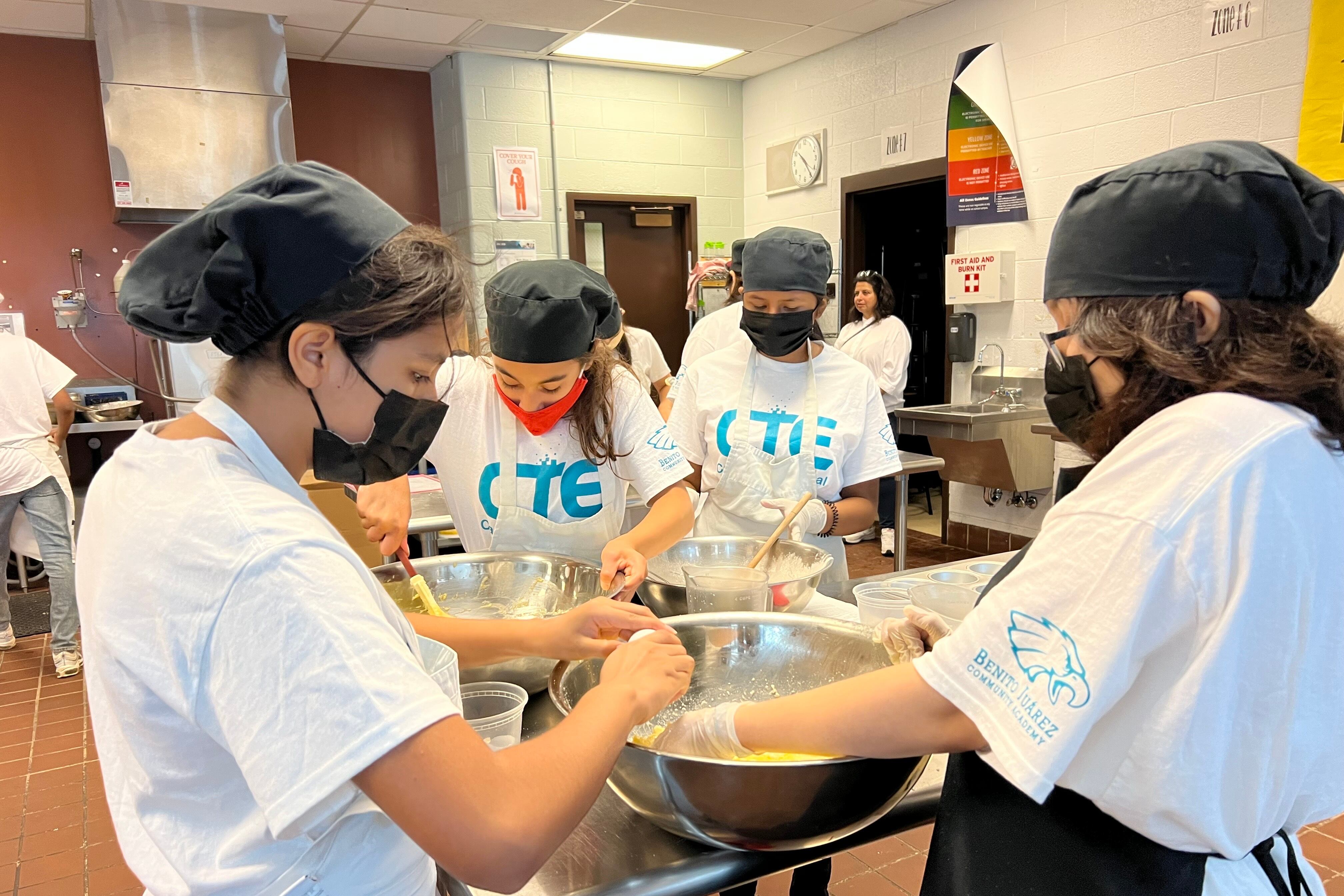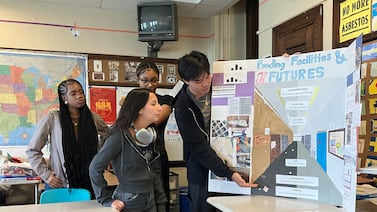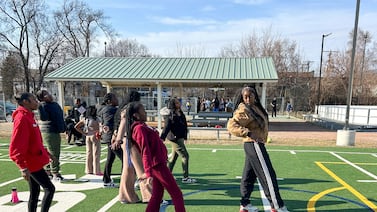Updated August 8, 2022.
An earlier version of this story cited a lower overall enrollment number across Chicago Public Schools summer programs. That number was provided by the district during a presentation at the July school board meeting, but officials later said it was outdated and provided updated figures to Chalkbeat Chicago after publication.
Inside a culinary classroom at Benito Juarez High School, a teacher hands out flour, butter, sugar, milk, and eggs to 19 students. The teens bustle around the room, which is equipped with a large oven, stove, sink area, and shelves stocked with cooking equipment and supplies. They take the ingredients back to their tables to mix into batter for either chocolate or vanilla cupcakes.
Alejandro Martinez, a rising sophomore at Juarez, is among the students here on a hot day in late July. After starting his freshman year in the International Baccalaureate program, Martinez is now laser-focused on a career as a chef and hopes to attend culinary school – maybe even at Kendall College, which the campers visited earlier in the week.
The two-week-long camp was a chance for Martinez to hone his baking skills as he prepares for his sophomore year in the school’s culinary arts program.
It is one of dozens of summer programs Chicago Public Schools is offering this year.
Summer school – often viewed as an opportunity for struggling students to get additional support – has taken on an even more crucial role as districts across the country look for ways to reengage students who may have fallen behind or become disconnected during the pandemic.
In Chicago, which boasted an expanded summer school last year backed by federal pandemic recovery funds, the district has continued to target students who need help academically, but is also branching out to offer more robust camps and programs for anyone interested.
This year, more than 90,000 students are enrolled in 20 different types of summer programs hosted by CPS, a slight uptick from last summer but still short of the 92,000 students the district hoped to enroll, according to CPS.
According to updated figures provided to Chalkbeat, summer school enrichment provided at a local-school level seemed to be most popular, enrolling nearly 30,000 students out of an expected 15,000. A district spokesperson said offerings under the umbrella “Out of School Time” could include mentoring and local partnerships.
Many of the district’s summer programs saw lackluster enrollment, including those for students who are academically behind or with disabilities.
Some 10,000 students were eligible for Summer Bridge and Summer Acceleration, two programs for students who need help academically, according to the CPS website, but just 5,468 enrolled.
According to a presentation given at the July school board meeting by Megan Hougard, chief of college and career success, the extended school year program, which provides additional academic support for students with an Individualized Education Program, saw only 3,837 students of the 8,000 targeted students enroll.
Kickoff to Kindergarten – a program for the city’s newest students – enrolled 2,647 students of 7000 targeted students, according to the school board meeting presentation. And Preview to Pre-K, enrolled 1,117 students of 3,500 targeted students. Last year, there were similar challenges with enrollment, particularly in less established programs.
Chicago’s 28 Career and Technical Education Camps this summer – which includes the culinary camp at Juarez – enrolled 319 students out of its goal of 560 students.
Getting children to attend summer school is a challenge in districts across the country, said Catherine Augustine, a senior policy researcher and director at the RAND Corporation.
“Historically, summer programs have only addressed a pretty small proportion of kids in a district, maybe 10%,” Augustine said. “With the federal funding that districts have received that they can use for summer programs, some districts have started to serve a higher percentage, but there are challenges in letting kids and families know about these programs and then convincing them to sign up for them.”
Parents are more likely to enroll their children if a teacher or principal contacts them directly, Augustine said. Fliers sent home with students – one of the ways the Juarez program was promoted – are far less effective.
Even if school districts fail to reach all of the students they hope will attend, the students who end up going to summer school should benefit. Augustine said summer school programs have long been an effective tool for academic improvement.
To be effective, Augustine said, programs must provide enough exposure to instruction – three hours split between math and reading a day for five weeks has shown to be enough to yield improvement – and have a good curriculum and teachers, just like the school year.
It is difficult to know who is taking advantage of the variety of CPS summer school options this year. Chalkbeat filed a Freedom of Information Act request for age and school-level information about students attending summer school, but the district did not respond by publication time.
At Juarez, 23 students registered for the camp, including families not enrolled in CPS that were drawn through the district’s outreach, said Rita Cardenas, the school’s Career and Technical Education coordinator. Cardenas said fliers were sent home with students and one was posted on the school’s website.
Kristian, who is homeschooled during the year, came to the Juarez culinary camp after his mom signed him up. The 14-year-old said he likes the program because the participants get to eat the food they make every day. His favorite was pizza, which he prepared with chicken topping.
On the hot July day, as cupcakes baked in the oven, Jade Palumbo demonstrated how to decorate with frosting using a piping bag. Palumbo is a 2020 graduate, one of many who returned to the school to help with summer school.
“I would not have any other job,” she said. “I love it here, and when I finish my teaching degree, I want to come right back here.”
As class came to an end, instructor Manny Oropeza asked the students questions about the cupcakes they had made and compared them to the muffins they had prepared days earlier.
The muffins and cupcakes, in addition to handmade pasta, are among the favorites of two returning campers, who said they came back because they had so much fun last year. This is their second year of culinary camp.
The students not only master culinary skills, Oropeza said, they also learn life skills – including sweeping, laundry, and washing dishes.
Earlier in the morning, for example, he asked the students to clean the dirty dishes around in the sink. Soon after, the area was cleared.
Eileen Pomeroy is a reporting intern for Chalkbeat Chicago. Contact Eileen at epomeroy@chalkbeat.org.





